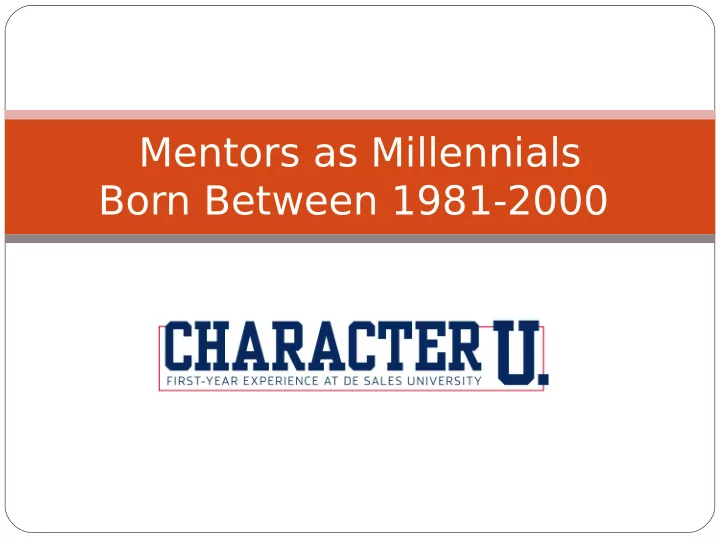

Mentors as Millennials Born Between 1981-2000
Sheltered • Highly protected as children. • Grew up with increasing safety measures. • Rarely unsupervised. • Were spared from unpleasant experiences. • May expect faculty/stafg, etc. to nurture them.
T eam-Oriented • Group-oriented rather than individualists. • May sacrifjce their own identity to be part of the team. • Prefer egalitarian leadership, not hierarchies. • Forming a tight-knit generation. • May politely exclude other generations. • Oriented toward service learning and volunteerism.
Special • Have always been treated as special and important. • All milestones are marked with celebrations and praise. • May carry a sense of entitlement. • Expect positive feedback • Claim they want privacy, but really crave attention. • Feel they are here to solve the world’s
Confjdent • Motivated, goal-oriented, and confjdent. • Expect college to help them launch to greatness. • Brag about their generation’s power and potential. • Have a high level of optimism. • Feel connected to their parents.
Achieving • Focus on getting good grades, hard work, extracurricular activities. • See college as the key to high paying jobs and success. • Pressured to decide on career at an earlier age (career tracks). • Focused on world of achievement rather than personal development.
Pressured • Tightly scheduled as children. • Lost sense of pure spontaneous play . • May struggle with free time and time management. • More hours of homework given then in previous generations. • Feel pressured to succeed. • Pushed hard to achieve, to avoid risks, & to take advantage of opportunities. • T ake on too much, then think others should be fmexible with scheduling confmicts. Thing multi-tasking is the smart thing to do.
Conventional • Respectful. • Civic-minded. • Believe the government knows what is best for them. • Fear being considered a non-conformist. • Clothing, music , and markings are very mainstream. • Value parents’ opinion highly.
QUESTIONS?
THANK YOU! • Dr. Gregg Amore, Director of Counseling and Student Development gregg.amore@desales.edu • Wendy Krisak, M.A., Assistant Director of Counseling & Coordinator of Character U wendy.krisak@desales.edu • Chad Serfass, B.A. Graduate Hall Director and Assistant Coordinator of Character U chad.serfass@desales.edu
Recommend
More recommend